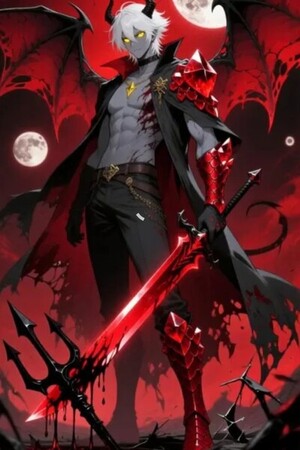Chapter 18:
god from the machine
Our School is Perfectly Ordinary
Shun raids the fridge instead of going directly to bed because he’s so hungry that he can’t fall asleep. When he does eventually sleep, he dreams he’s flying high above the city with his friends at his side. The sky is pastel blue, and he has a pair of wings on his back like the decorative pen cap of Hiro’s wand.
In the morning, Atsuko wakes him up rudely by banging on his door because he slept through his alarm. There is no mention of him coming home late at the dining table, and Shun eats breakfast quickly and prepares for school. His thoughts drift back to the breathtaking view of the city at night.
“Mum saw your test papers,” his sister mentions, her words dragging him back to reality like the sun pulling Icarus down from the sky. “Not too shabby. Maybe you can make it to a top university after all.”
“Who was the one who always said ‘high school is the spring of your youth’?” Shun quotes, ducking to avoid getting a newspaper thrown in his face. “I’m in first year, let me live.”
“Rude much?” Atsuko says crossly. “This is why you’ve got no friends.”
“I do have friends,” he retorts. “You literally met Saori last week.”
“Hmm. So her name is Saori.”
Shun’s out the door in a flash, ignoring his sister hollering at him to give her more details.
Yesterday’s trip feels like a dream, but the soreness in his legs reminds him that it’s not. He’s kind of wishing he has a broomstick to take him to school instead of having to walk the entire way. Every step he takes makes his thighs ache.
Sometimes if he looks up, Hiro would be circling the school grounds like a hawk. But he has no such luck today, and so he trudges all the way to the school building like a normal person.
When he gets to the classroom five minutes before the bell, Shun is greeted by all his friends crowding around his desk. Miwa is sitting in his seat. Even Hiro is there, punctual for the first time in a while.
“Yo! Shun!” he calls, waving him over.
“I could barely get up this morning,” Miwa is telling the others as Shun approaches. “I read about how hikes are super fun to do with friends but we are never doing that again.”
“Ah, was it that bad?” Saori says, sounding genuinely surprised. “I thought it was good exercise.”
“Says the girl who wanted to run up the mountain,” Miwa sniffles. “I’m not sporty at all, dang it! I was a theatre kid!”
A theatre kid.
A theatre kid.
Why does that ring a dim, warning bell in the back of Shun’s mind? Why is he remembering standing in front of a sweeping amphitheatre, blinking the blinding stage lights and sweat out of his eyes?
All the world’s a stage, and he is merely a player.
The thing is, he hasn’t actually done theatre since seventh grade, but the experience of it that spans years and years has only been dormant in the back of his mind. The muscle memory from aikido, the one semester of playing the flute in the concert band club, the other clubs he’s tried over the years—they all pale in comparison.
And then, like the draping curtains opening up across the stage in front of him, a long-forgotten memory appears in the forefront of his mind.
Shun remembers flipping through the script he’s already memorized several times over. He’s sitting cross-legged at the edge of the empty stage, running through the scenes in the first act over and over again.
“You’re always so hardworking,” a girl’s voice sounds from his right, high and sweet and familiar. “You’re not even playing a lead role.”
He looks up. Miwa in sixth grade wears her red hair in a single ponytail tied at the base of her neck. Her eyes are the colour of the shallow seas and framed with thick lashes. Even under the harsh stage lights of a technical rehearsal, she shines like the brightest star in the sky.
“You work just as hard, if not more,” he says. “And you still make mistakes.”
“Wowwww, that’s not a very nice thing to say to the leading actress,” she sniffs. “My acting is impeccable.”
“That’s why you’re the face of the club.”
“Say,” she says suddenly. “What would you do if I moved away?”
The script slips from his hands and falls to the floor.
“Are you moving away?”
“After the last matinée performance next week. It’s okay, Yukina from your class will take care of the closing night.”
“Wait, why? Where are you going?”
“Dad says I can’t say,” Miwa says hesitantly. “But I’ll be going to a different school.”
“How far away?” Shun asks.
Miwa presses her lips tightly together. Her gaze sweeps across the empty theatre, before finding him again.
“If we meet again…” she says hesitantly, almost as if she’s talking to herself. “I’ll say hi to you first. I promise.”
“What do you mean—?”
“You can’t…get too close,” she murmurs, so quiet that he can no longer hear. “Sorry, Takeuchi.”
And then Shun blinks back into reality.
Miwa is tilting her head at him in the present-day, her eyes as bright as the brilliant turquoise of his memories. It’s as if the last puzzle piece finally fits into the space of his mind, why all of his friends seem so familiar despite befriending each of them coincidentally.
And the strangest sense of relief floods his heart. It’s as if the four of them were always meant to find each other somehow, that he isn’t stealing other peoples’ friends away just because he accidentally stumbled upon secrets he shouldn’t.
It sounds stupid, but he really is relieved.
“Takeuchi, Takeuchi,” Miwa says, reaching over to poke him in the arm. “Are your legs killing you too, or am I suffering alone? Please don’t tell me I’m suffering alone.”
“Shun does aikido or something,” Hiro says. “That’s the gentlest martial art there is.”
“Yeah, I—” Shun blurts out. “I was a theatre kid too. Remember, we—”
“Oops, class is starting,” Miwa interjects, standing up suddenly. “Gotta get back to my seat, see you next year…”
Shun doesn’t get an opportunity to ask her again until lunch, but he decides against bringing it up. At this point, he’s already resigned himself to the fact that many of his childhood memories were supernaturally erased, or lost as a result of blunt trauma.
What's past is prologue, or something. He’d much rather focus on the here and now, of the friends right in front of him.
(And the memories he might not get to keep at the end of the year, his brain reminds him, unhelpful as usual.)




Please sign in to leave a comment.